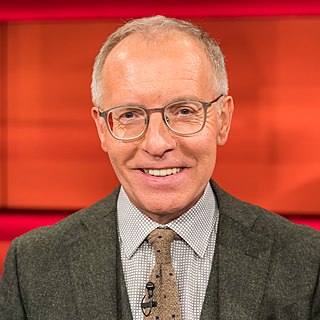Related Research Articles

Andrea Fischer was a member of the German Bundestag for the German Green Party and from 1998 until 2001 Federal Minister for Health. She dropped out of the Bundestag in 2002.

The Stiftung Wissenschaft und Politik (SWP) in Berlin is a civil-law foundation and the founding institution behind the German Institute for International and Security Affairs. It advises the Bundestag and the federal government on foreign and security policy issues. SWP also advises decision-makers in international organisations relevant to Germany, above all the European Union, NATO and the United Nations. SWP is a leading European think tank in international relations.
Uwe Wagschal is a German political scientist.
Klaus Gustav Heinrich von Beyme is Professor of Political Science Emeritus at the Faculty of Economic and Social Sciences of the University of Heidelberg.

Hans-Joachim Veen is a German political scientist who since 1994 works as honorary professor at the University of Trier, Germany.

Horst Möller is a German contemporary historian. He is Professor of Modern History at the Ludwig Maximilian University of Munich (LMU) and, from 1992 to 2011, Director of the Institut für Zeitgeschichte.

Matthias Theodor Vogt is a German academic with a focus on cultural policy and an author of studies on cultural conditions that might serve to strengthen the democratic potential in diverse European countries. Between 1992 and 1995, Vogt developed the overall blueprint for the Free State of Saxony’s law on cultural areas, and contributed to its acceptance and implementation. Since 1994 he has acted as the founding director of the Saxonian Institute for Cultural Infrastructure and since 1997 has been Professor for Cultural Policy and Cultural History at the Zittau/Görlitz University of Applied Sciences. In 2012, Vogt was made honorary professor of the University of Pécs and in 2014 was awarded the Officer’s Cross of the Order of Merit of the Republic of Poland for his contributions to German-Polish cooperation. Matthias Theodor Vogt is a Roman Catholic; he is married and has three children.
Stefan Fröhlich is a German political scientist and professor for International Relations at the Friedrich-Alexander-University Erlangen-Nuremberg. Emphasis in his work is on German foreign policy, transatlantic relations and US foreign policy, European foreign and security policy, and International Political Economy.

Caroline Robertson-von Trotha is a Scottish sociologist and cultural scientist, working in Germany.
Wolfram Adolphi is a German journalist and political scientist. From 1990 until the 1991 revelation that he had been an informant for the Stasi, he was head of the Berlin chapter of the Party of Democratic Socialism (PDS), which was a forerunner to the current Left Party.

Widerstand. Zeitschrift für nationalrevolutionäre Politik was a monthly magazine established in Germany in 1926 to advocate National Bolshevism. It was published in Berlin, under the editorship of Ernst Niekisch. Prominent contributors included Ernst Jünger, Friedrich Georg Jünger, August Winnig, and Joseph E. Drexel. The newspaper was shut down in December 1934. After a time in the underground, Niekisch was arrested and held in Nazi concentration camps from 1937 to 1945.
The League of West German Communists was a Maoist communist political organization in the Federal Republic of Germany, active between 1980 and 1995 and one of the last surviving "K-Groups" (de) established in the aftermath of the German student movement. Following the German reunification, it merged into the Party of Democratic Socialism.
Wolfgang Zapf was a German sociologist.
The Rote Revue was an organ of the Social Democratic Party of Switzerland and existed between 1921 and 2009.

Peter Weingart is a German professor emeritus in sociology and former director of the Center for Interdisciplinary Research, Bielefeld.
Simone Lässig is the director of the German Historical Institute Washington DC and a cultural and social historian of the nineteenth and twentieth centuries.
Stephan Welk is a German business economist and probably diplomat. He claims to have been in the Diplomatic Service of African countries such as São Tomé and Príncipe since 2015 and Central African Republic since 7 February 2018. In September 2019 Welk was detained for selling fraudulent diplomatic passports, his most famous customer being the former tennis star Boris Becker.
Prague German was the dialect of German spoken in Prague in what is now the Czech Republic. The written form of this dialect from the Luxembourg rule played an important role in the history of the German language for its balancing function between the written upper Austrian and southern German dialects and eastern Central dialects of central Germany, which later developed the spelling of Modern German writing (Hochdeutsch).

Karl-Rudolf Korte is a German political scientist and since 2002 professor at the University of Duisburg-Essen on Campus Duisburg. He appears regularly in national media as a guest for election analyses.
Fred K. Prieberg was a German musicologist. He was a pioneer in the field of history of music and musicians under the Nazi regime.
References
- 1 2 "DE Deutschland magazine: Cutting-edge research". Auswaertiges Amt. Retrieved 6 August 2015.
- 1 2 Western Europe 2003. Psychology Press. 30 November 2002. p. 294. ISBN 978-1-85743-152-0 . Retrieved 28 February 2016.
- ↑ "Deutschland : Zeitschrift für Politik, Kultur, Wirtschaft und Wissenschaft". lib.ugent.be. n.d. Retrieved 2018-12-11.